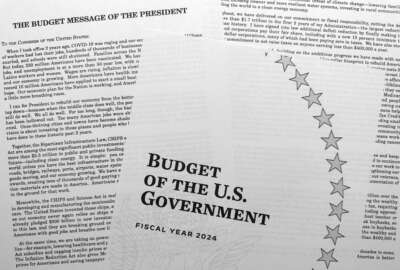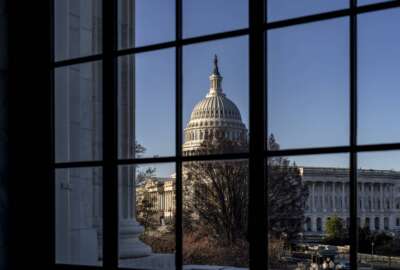
At least the congressional budget hearings are following regular order
TikTok was not the only thing discussed on Capitol Hill last week. Good old-fashioned budget hearings also broke out all over. They revealed a lot about hoped-f...
TikTok was not the only thing discussed on Capitol Hill last week. Good old-fashioned budget hearings also broke out all over. They revealed a lot about hoped-for spending priorities in 2024. For the details, the Federal Drive with Tom Temin spoke with Jack Fitzpatrick, a congressional reporter with Bloomberg Government.
Interview transcript:
Tom Temin You went to several hearings last week on budgets. Tell us about some of the particulars that you heard and also maybe the context of this because of the debt ceiling question that seems to be intertwined here.
Jack Fitzpatrick Yeah, there was a lot of big picture talk as well as a focus on details of agency requests. The big picture stuff is the Biden administration is asking for an increase in funding that Republicans don’t like. Now, there are differences that they see for defense versus non-defense priorities. Biden asked for a greater increase for non-defense discretionary agency budgets than he did for the military. There are Republicans in the House who say they want to cut spending, but that it would not primarily be focused on the military or veterans. Big picture, they want to attach spending caps, limits over maybe something like ten years, to a debt limit deal to say the House Republicans say ‘we want to cut discretionary spending to the 2022 levels.’ It’s about $130 or $140 billion cut from 2023 and then limit the growth to about 1% a year from then on. That, in a macro sense, is a big fight that they’re going to have to have, and they’re at the beginning of that. On some of the details, the State Department request is an interesting dividing line for some Republicans. The House Republicans are more skeptical about foreign aid, sending funds to Ukraine. Overall, the top line State Department and USAID funding level. Lindsey Graham (S.C.), who’s the top Senate Republican on that topic, said the House is going to be part of this. So we can’t give you the 11% increase the State Department requested, but we’ll do what we can. So you may have a bit of a debate actually playing out between House Republicans and Senate Republicans on that in particular. But really, you go through the list and a lot of the non-defense stuff is a bright red dividing line between the conservative Republicans in Congress and the Biden administration.
Tom Temin There’s no apparent talk or indication that sequestration should come back, could come back?
Jack Fitzpatrick It’s not really the sequestration that was put in place after the 2011 debt limit fight. That came into place out of the supercommittee’s failure and the series of negotiations where they tried to get something much more ambitious to cut spending and then failed. Right now, what you’re hearing instead of something like that is the Freedom Caucus has said — and a lot of Republicans seem to be on board with — cutting discretionary spending to the fiscal 2022 level, limiting the growth from there rather than a really, really steep cut. It would be a fairly steep cut, but not quite to the 2011 levels. And then looking at what unspent money from COVID bills, they could rescind stricter work requirements and stopping exemptions at the state level for work requirements for things like SNAP benefits. Really, the demands being made by Republicans are a little less ambitious than what you saw in 2011. It’s probably a tougher debate, though, because they have such a narrow majority in the House. So it’s still a dicey situation with the debt limit, but the spending cap stuff is a little bit more realistic than in 2011, you heard people calling for a constitutional amendment to balance the budget. They’re not quite at that level right now.
Tom Temin And on the military budget side, Gen. [Mark] Milley, the chairman of the Joint Chiefs, was giving dire warnings about the fact that if we don’t meet the Chinese threat now, then we’ll end up doubling the Defense budget down the line when some threat turns into action, perhaps.
Jack Fitzpatrick Yeah, they’re getting pulled in a lot of different directions by Congress in response to the Defense spending increase proposals, about a 3.3% increase that the Biden administration will propose. House Republicans have said they’re not going to try to cut Defense spending. There seems to be some diversity of opinion among House Republicans about whether that should be an increase, something more or less flat lined. They haven’t really developed a clear stance on that. Senate Republicans, including people like Sen. Graham and others, have said a strong Defense number is a priority for them. So that, in addition to some of the foreign aid State Department stuff, is potentially a fight among Republicans. Meanwhile, you have progressives, [Rep.] Barbara Lee (D-Calif.) in the House who’s interested in becoming a senator from California, raised this. It’s been a little quieter lately. But she she said the progressive position for members like her is that they should cut $100 billion from the defense budget. There was some pushback even from [Office of Management and Budget] Director Shalanda Young. This is an area where the most progressive anti-defense spending progressives have probably lost the bulk of their party’s support, and there’s interest among the most mainstream leadership-aligned Democrats in at least some sort of increase in Defense spending.
Tom Temin We’re speaking with Jack Fitzpatrick, congressional reporter with Bloomberg Government. And did the inflation effect come up? Because Democrats that want to increase spending, they are in a tough political shape, talking about one reason for that being inflation, because then they are seen as responsible for the inflation simply because of the fiscal policies and the monetary policies under the Biden administration.
Jack Fitzpatrick Yeah, that came up a lot. That is going to continue to dominate the conversation around spending. The response from the Biden administration is, yes, we want an increase in discretionary spending. And there are some other things. You know, they want a revival of the expanded child tax credit. They proposed about $2.9 trillion in deficit reducing tax increase measures for people making more than $400,000 a year, billionaires minimum tax, that kind of thing. Those are not going to get bipartisan support in a divided Congress. That’s obviously not going to happen. So the conversation has then sort of been shifted away from either party’s big, ambitious goals for tax revenue and major spending cuts. And it’s kind of been narrowed down to what do you do with the discretionary budget, which is not even half of the whole federal budget. But that’s sort of the manageable thing that they will have to have a deal on. So a lot of the lofty speech about the trajectory of the debt and deficit, it has come up, but really the negotiations are in a practical sense just focused on a smaller part of the federal budget.
Tom Temin I don’t think they even believe it themselves when they say it. And the other question is, with the hearings happening, what sense is there that these will translate into actual bills that they’ll vote on at some point and maybe avoid the usual problems at the end of the fiscal year?
Jack Fitzpatrick They’re actually pretty ambitious about setting a schedule there. House Republicans came in and said, we have the majority. One of our top priorities is we are going to vote individually on each of our 12 appropriations bills. That may have even kind of scared the Senate into taking action. The Senate hasn’t even been holding markups lately. They didn’t hold markups last year. They marked up a couple of bills the year before that, but they hadn’t been doing floor votes. There was a bipartisan agreement recently among Senate appropriators that they are going to try not only to get going on markups, but they’re going to try to have a bipartisan deal among themselves on the topline spending figures and then start holding their mark ups, they said the beginning of the markup season, no later than Memorial Day. So get started in May, which would be a lot better than last year: Essentially the Senate Democrats put out their appropriations bills as like a press release at the end of July and didn’t vote on it. So there’s a lot of action there and there is some hope that it’d be tough to get all 12 enacted by the September 30th deadline, but something like getting a couple of them done and then a [continuing resolution] for the rest would be a somewhat realistic accomplishment that senators are pretty excited about.
Tom Temin And what’s on the agenda for the upcoming week? More hearings, more budgets?
Jack Fitzpatrick Yeah, a ton of hearings on the budget. There are going to be quite a few. There’s a matter of weeks ahead of hearings in the Appropriations Committee and authorizing committees to review. Almost every agency’s budget is up for scrutiny in both chambers. I don’t know if this will be in the week ahead or maybe in a couple of weeks ahead. But as House Republicans are working on a budget resolution that technically is supposed to essentially start the spending process and would potentially serve as effectively an offer on the debt limit, these would outline their fiscal priorities. That is getting bumped a little bit. But House Republicans, meanwhile, are working on a more limited focused on the debt limit offer, sort of a list of bullet points that is the House Republican offer on the debt limit. We don’t know exactly when that’s coming out, but the budget chairman, [Rep.] Jodey Arrington (R-Texas), said they’re getting close to being able to get the whole conference on board and say ‘this is our offer.’ So there’s work; a little bit longer on a budget resolution and a lot of these hearings, but also in the fairly near future, something on the debt limit from the House Republicans.
Tom Temin Yeah. So maybe they could sing out their bullet points on TikTok and kind of bring it all around.
Jack Fitzpatrick I think they would be loath to do that, especially given the hearings that happened in the last week.
Copyright © 2024 Federal News Network. All rights reserved. This website is not intended for users located within the European Economic Area.
Tom Temin is host of the Federal Drive and has been providing insight on federal technology and management issues for more than 30 years.
Follow @tteminWFED





